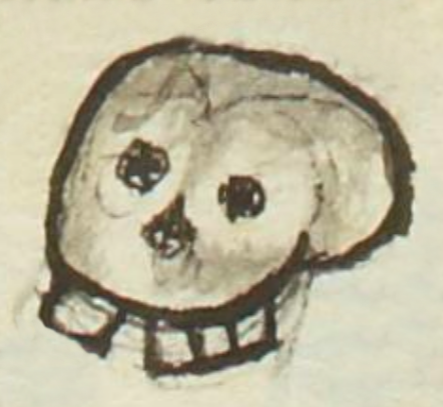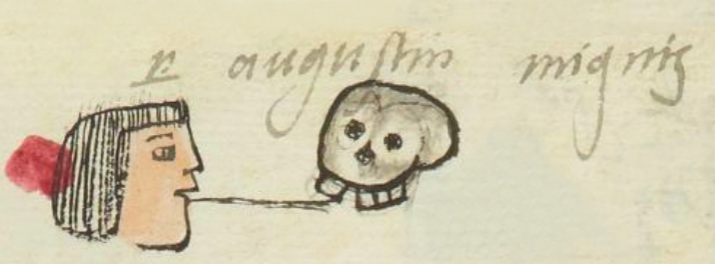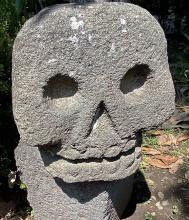Miquiz (MH518r)
This black-line drawing of the simplex glyph for the personal name Miquiz (here, attested as a man's name) is a skull, an logogram representing death (miquiztli. The skull is shown in a 3/4 view, at a bit of an angle toward the viewer's left. The nose hole and the eye cavities are black. Much of the skull has a light gray wash over it, but white areas have been left around the eyes and nose. The four visible teeth are left neutral or white.
Stephanie Wood
Miquiztli (death) is a day sign in the 260-day divinatory calendar called the tonalpohualli. So, the man named Agustín Miquiz may have born on that day. But we do not have the numerical value that would have accompanied the death sign, a number from 1 to 13. The number may have faded from use or perhaps it was suppressed to disguise the name's association with the divinatory calendar.
The iconography of miquiztli and related word will vary considerably across manuscripts. One example, below, is very colorful. The glyph shown below for the verb "to die" (miqui) has what is called a starry or stellar eye, which associates it with the celestial realm. Calendrics were important in the Nahuas' religious view of the cosmos.
Stephanie Wood
augustin miguiz
Agustín Miquiz
Stephanie Wood
1560
Jeff Haskett-Wood
death, muerte, días, days, dates, fechas, calendars, calendarios, nombres de hombres
This stone sculpture of a human cranium is presumed here to speak to death (miquiztli), although the museum signage does not use that word. The skull looks something like the hieroglyph above, with its dark eye sockets. But the glyph only shows upper teeth, whereas this sculpture also shows lower teeth. Photo by Rebecca Horn, 13 August 2023, at the Museo de Escultura Mexica in the archaeological site of Santa Cecelia Acatitlan in the region of Tlalnepantla, Mexico City.

miquiz(tli), death, https://nahuatl.wired-humanities.org/content/miquiztli
Muerte
Stephanie Wood
Matrícula de Huexotzinco, folio 518r, World Digital Library, https://www.loc.gov/resource/gdcwdl.wdl_15282/?sp=115&st=image
This manuscript is hosted by the Library of Congress and the World Digital Library; used here with the Creative Commons, “Attribution-NonCommercial-ShareAlike 3.0 License” (CC-BY-NC-SAq 3.0).










